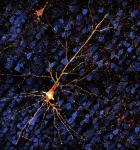(Press-News.org) Vienna, Austria: Cannabidiol (CBD), one of the active ingredients in cannabis, is thought to be safe as it does not cause a “high”. Increasing numbers of pregnant women take CBD, believing that it can help alleviate symptoms such as morning sickness, insomnia, anxiety and pain.
However, research presented today (Tuesday) at the Federation of European Neuroscience Societies (FENS) Forum 2024 [1,2], suggests that it may affect offspring. Two studies in mice have shown that gestational exposure to CBD alters the behaviour of offspring and also affects the nerve cells (neurons) in the insular cortex (IC) of the brain that is involved in processing emotions and signals from the senses.
Dr Daniela Iezzi and Ms Alba Caceres Rodriguez, a PhD student, work in the team “Sex differences in developmental vulnerability to neuropsychiatric diseases” at INSERM Université Aix-Marseille, France, directed by Pascale Chavis. Ms Caceres Rodriguez says that the last International Cannabis Policy Study reported that one in five pregnant women reported using CBD [3, 4].
“Scientific evidence has proven that CBD crosses the placenta, can reach the brain of rodents and human embryos and is also present in breast milk; therefore, it’s a public health priority to understand the impact of CBD on the developing nervous system as we don’t yet know the consequences of CBD exposure to the brain during development,” she says.
“An important part of the research that we are conducting in mice is a longitudinal follow-up of the behavioural consequences of gestational exposure to CBD, and we are also investigating what is happening to the neurons in the brain that may be the basis of such changes in behavioural traits.”
Dr Iezzi and Ms Cáceres Rodríguez injected pregnant female mice subcutaneously with a low dose of CBD (3mg/kg) from day 5 to day 18 – almost the entire gestational period of a mouse. Injections meant they could be sure the mice received the same concentrations of CBD each day. Another group of pregnant mice were not treated with CBD and acted as the control group.
After the pups were delivered, the researchers waited for them to become adults and then tested their behaviours with a technology that uses infra-red, depth-sensing cameras and machine learning (or artificial intelligence, AI) called ‘Live Mouse Tracker’. This allowed them to detect a large range of behaviours when the mice were placed in a new environment for several days.
“We found a number of behavioural changes among the mice exposed to CBD,” says Ms Caceres Rodriguez. “CBD-exposed females tended to move around their new environment more compared to females that didn’t receive CBD during gestation. Furthermore, compared to control mice, both male and female mice treated with CBD established more physical contacts with each other.
“These findings indicate that prenatal exposure to CBD alters specific behaviours of groups of mice and that this depends on their sex. A strength of our study is that we are able to reproduce a more naturalistic environment, which permits us to study group dynamics that would be impossible to unmask with other conventional tasked-based tests. In addition, a follow-up of several days enables us to analyse the development and progression of such dynamics. This study serves as a good starting point to dive deeper to understand the actual consequences of these changes in overall social interactions in the long term.”
This research is carried out in mice so caution is necessary when considering any implications for humans. However, in addition to what is known about CBD crossing the placenta and being present in breast milk in both mice and humans, it is also known that cannabis intake can affect brain development in mice and humans. A limitation of the study is that mice had a controlled amount of CBD administered for more than two-thirds of their pregnancy, whereas humans might be more likely to take CBD intermittently to help with symptoms that might vary over the course of the pregnancy, and might take considerably larger doses.
Dr Iezzi investigated how CBD affected two parts of the insular cortex in the brain: the anterior IC (aIC), which is responsible for processing emotional and social signals, and the posterior IC (pIC), which processes perceptions of pain and the physical and emotional state of the body.
“In 2022 we used artificial intelligence to demonstrate for the first time that prenatal exposure to a low dose of CBD can modify the early communication and cognition during the early stages of development in mice. So, we wanted to go deeper into the impact of this substance in the brain and, specifically, the insular cortex, which is known to be a region in the brain responsible for emotions and sensory perception,” she says.[5]
Dr Iezzi studied the brains from adult mice that had been exposed to CBD during gestation in the same way as in Ms Caceres Rodriguez’s research. She compared them with the brains from the control group of mice that had not been exposed to CBD.
“We examined specific brain cells called pyramidal neurons in both aIC and pIC and discovered noteworthy distinctions between these neurons in adult male and female mice exposed or not to CBD,” she says.
“Our results reveal that prenatal exposure to CBD profoundly changes the functionality of neurons in the insular cortex. We saw differences according to sex and also according to the IC sub-regions. In particular, pyramidal neurons in the pIC lose their cellular identity following prenatal exposure to CBD and no longer behave like typical pIC neurons. This could have negative consequences on specific functions of the pIC. These neurons specialise in integrating sensory information from the environment and the internal state of the body in order to generate an appropriate behavioural response. Therefore, a loss of pIC differentiation following prenatal exposure to CBD can have a considerable impact on the ability to understand and react properly to the environment.
“These findings have significant implications for understanding the effects of CBD on foetal life, changing the general idea that CBD is a universally safe compound, and revealing the need for additional studies on the effect of prenatal CBD exposure. Furthermore, several studies have shown that IC disfunction increases the risk of developing psychiatric disorders, including anxiety, addiction, depression and schizophrenia.”
Dr Iezzi and Ms Caceres Rodriguez are now joining forces to find the possible molecular and cellular mechanisms that would explain their results.
Professor Richard Roche, Deputy Head of the Department of Psychology at Maynooth University, Maynooth, County Kildare, Ireland, is chair of the FENS communication committee and was not involved in the research. He said: “Just because cannabidiol is legal and available in most countries does not mean that it is safe for women to consume during pregnancy. The consequences of exposing developing brains of foetuses to CBD has not been thoroughly researched so far. These two studies carried out in mice show that exposure to CBD during gestation does affect offspring. More research is required to be sure about the possible effects in humans, but these findings are an early indication that women should not take CBD during pregnancy until more is known. In addition, more information and better data are needed to understand the prevalence of CBD use during pregnancy, particularly in Europe.”
(ends)
Notes to editors
[1] PS03-27AM-619.“The influence of prenatal CBD exposure on group dynamics and social behaviours in adult offspring”, Ms Alba Caceres Rodriguez, Poster session 03 – Late-breaking abstracts, Thursday 27 June, 09.30-13.00 hrs, Poster area: https://fens2024.abstractserver.com/program/#/details/presentations/4793.
[2] PS03-27AM-602. “Understanding the consequences of prenatal CBD exposure on insular cortex neurons: sex-specific alterations and the loss of subregional functional differentiation”, Dr Daniela Iezzi, Poster session 03 – Late-breaking abstracts, Thursday 27 June, 09.30-13.00 hrs, Poster area: https://fens2024.abstractserver.com/program/#/details/presentations/4842
[3] Bhatia D, Battula S, Mikulich-Gilbertson S, Sakai J, Hammond D, “Cannabidiol-Only Product Use in Pregnancy in the United States and Canada: Findings from the International Cannabis Policy Study”. Obstet Gynecol. 2024 May 9. doi: 10.1097/AOG.0000000000005603.
[4] Figures for CBD use by pregnant women in Europe are scarce. In the USA, cannabis has been legalised in several states and women are more likely to report CBD use than in Europe.
[5] Iezzi et al., “In utero exposure to cannabidiol disrupts select early-life behaviors in a sex-specific manner”. Transl Psychiatry. 2022 Dec 5;12(1):501. doi: 10.1038/s41398-022-02271-8
END
New research questions safety of cannabidiol for pregnant women
Mouse studies show alterations in brains and behavior in offspring exposed to CBD during gestation
2024-06-25
ELSE PRESS RELEASES FROM THIS DATE:
Scientists can now detect antibiotics in your fingerprints – aiding the fight against drug-resistant TB
2024-06-25
A fingerprint may soon be all a doctor needs to check whether tuberculosis patients are taking their antibiotics – thanks to a new study led by the University of Surrey.
Scientists successfully detected the drugs in finger sweat – and with almost the same accuracy as a blood test.
Professor Melanie Bailey, an analytical chemist and co-author of the study from the University of Surrey, said:
“Up until now, blood tests have been the gold standard for detecting drugs in somebody’s ...
Heart disease model puts cells to work
2024-06-25
By Leah Shaffer
Using animals to study heart disease doesn’t always translate well to human health outcomes, and human heart cells available for research don’t work outside the human body.
“You can’t keep them alive, much less function outside of the person for long enough to study these processes,” said Nathaniel Huebsch, an assistant professor of biomedical engineering in the McKelvey School of Engineering at Washington University in St. Louis. Huebsch is studying cells with a mutation that causes hypertrophic cardiomyopathy (HCM), a disease that can set off heart failure ...
Positive emotion skills combat burnout among health care workers
2024-06-24
Intervention improved well-being in workers who were highly stressed by the job
Health care worker burnout was on the rise before COVID-19 and continues today
Addressing significant structural barriers in U.S. health care ‘needs to be a top priority’
Easily accessible individualized solutions also are needed to boost well-being in stressed health-care workers
CHICAGO --- The COVID-19 pandemic exacerbated already rising rates of burnout among American health care workers. A new Northwestern University study found learning and practicing skills that increase positive emotion like gratitude, mindful awareness and self-compassion ...
Partridge receives Department of Energy Vehicle Technologies Office Lifetime Distinguished Achievement Award
2024-06-24
Bill Partridge, a recently retired distinguished researcher at the U.S. Department of Energy’s Oak Ridge National Laboratory, was recognized by DOE’s Vehicle Technologies Office, or VTO, for leading world-class research in transportation throughout his 25-year career. His expertise has guided the development of advanced diagnostic tools that enabled next-generation engines and emissions control systems.
Partridge was presented the Lifetime Distinguished Achievement Award during the VTO Annual Merit Review held on June 3, 2024, in Washington, D.C. He was nominated for the award by the VTO Decarbonization of Offroad, Rail, Marine ...
ACP offers recommendations to support LGBTQ+ health care equity
2024-06-24
Embargoed for release until 5:00 p.m. ET on Monday 24 June 2024
Annals of Internal Medicine Tip Sheet
@Annalsofim
Below please find summaries of new articles that will be published in the next issue of Annals of Internal Medicine. The summaries are not intended to substitute for the full articles as a source of information. This information is under strict embargo and by taking it into possession, media representatives are committing to the terms of the embargo not only on their own behalf, but also on behalf of the organization they represent.
----------------------------
1. ...
Survey shows aspirin use remains high among older adults, despite risks
2024-06-24
Embargoed for release until 5:00 p.m. ET on Monday 24 June 2024
Annals of Internal Medicine Tip Sheet
@Annalsofim
Below please find summaries of new articles that will be published in the next issue of Annals of Internal Medicine. The summaries are not intended to substitute for the full articles as a source of information. This information is under strict embargo and by taking it into possession, media representatives are committing to the terms of the embargo not only on their own behalf, but also ...
New research shows why you don’t need to be perfect to get the job done
2024-06-24
When neuroscientists think about the strategy an animal might use to carry out a task – like finding food, hunting prey, or navigating a maze – they often propose a single model that lays out the best way for the animal to accomplish the job.
But in the real world, animals – and humans – may not use the optimal way, which can be resource intensive. Instead, they use a strategy that’s good enough to do the job but takes a lot less brain power.
In new research, Janelia scientists set out to better ...
Detection and genetic analysis of songling virus in Haemaphysalis concinna near the China-North Korea Border
2024-06-24
https://www.scienceopen.com/hosted-document?doi=10.15212/ZOONOSES-2024-0004
Announcing a new article publication for Zoonoses journal. Songling virus (SGLV) is a spherical, enveloped, fragmented, negative-stranded RNA virus belonging to the genus Orthonairovirus in the Nairoviridae family. SGLV is transmitted by ticks and can cause disease in humans. This study identified and characterized SGLV in Haemaphysalis concinna ticks collected in 2023 in the Yanbian Korean Autonomous Prefecture (China) near the China-North Korea border.
A real-time quantitative ...
Leading the way in nursing home care
2024-06-24
A researcher at the University of Missouri has developed a program that improves the quality of care and reduces avoidable hospitalizations in nursing homes — saving Missouri nursing homes and Medicare millions of dollars and allowing Missouri nursing homes to invest more in retaining their most skilled staff members. The program is so successful that it’s being recommended for use in all 50 states.
The Quality Improvement Program for Missouri (QIPMO) was created by Marilyn Rantz in 1999 as a partnership between Mizzou’s Sinclair School of Nursing and the Missouri Department of Health and Senior Services.
For the past 25 years, the program has allowed Rantz and ...
Exploring early stage Alzheimer’s disease
2024-06-24
Research in nonhuman primates is opening the possibility of testing treatments for the early stages of Alzheimer’s and similar diseases, before extensive brain cell death and dementia set in. A study published June 21 in Alzheimer’s & Dementia: The Journal of the Alzheimer’s Association shows up to a six-month window in which disease progress could be tracked and treatments tested in rhesus macaques.
“This is a very powerful translational model to test interventions that target the tau protein,” said John H. ...
LAST 30 PRESS RELEASES:
Researchers develop new strategy for improving inverted perovskite solar cells
Yes! The role of YAP and CTGF as potential therapeutic targets for preventing severe liver disease
Pancreatic cancer may begin hiding from the immune system earlier than we thought
Robotic wing inspired by nature delivers leap in underwater stability
A clinical reveals that aniridia causes a progressive loss of corneal sensitivity
Fossil amber reveals the secret lives of Cretaceous ants
Predicting extreme rainfall through novel spatial modeling
The Lancet: First-ever in-utero stem cell therapy for fetal spina bifida repair is safe, study finds
Nanoplastics can interact with Salmonella to affect food safety, study shows
Eric Moore, M.D., elected to Mayo Clinic Board of Trustees
NYU named “research powerhouse” in new analysis
New polymer materials may offer breakthrough solution for hard-to-remove PFAS in water
Biochar can either curb or boost greenhouse gas emissions depending on soil conditions, new study finds
Nanobiochar emerges as a next generation solution for cleaner water, healthier soils, and resilient ecosystems
Study finds more parents saying ‘No’ to vitamin K, putting babies’ brains at risk
Scientists develop new gut health measure that tracks disease
Rice gene discovery could cut fertiliser use while protecting yields
Jumping ‘DNA parasites’ linked to early stages of tumour formation
Ultra-sensitive CAR T cells provide potential strategy to treat solid tumors
Early Neanderthal-Human interbreeding was strongly sex biased
North American bird declines are widespread and accelerating in agricultural hotspots
Researchers recommend strategies for improved genetic privacy legislation
How birds achieve sweet success
More sensitive cell therapy may be a HIT against solid cancers
Scientists map how aging reshapes cells across the entire mammalian body
Hotspots of accelerated bird decline linked to agricultural activity
How ancient attraction shaped the human genome
NJIT faculty named Senior Members of the National Academy of Inventors
App aids substance use recovery in vulnerable populations
College students nationwide received lifesaving education on sudden cardiac death
[Press-News.org] New research questions safety of cannabidiol for pregnant womenMouse studies show alterations in brains and behavior in offspring exposed to CBD during gestation




